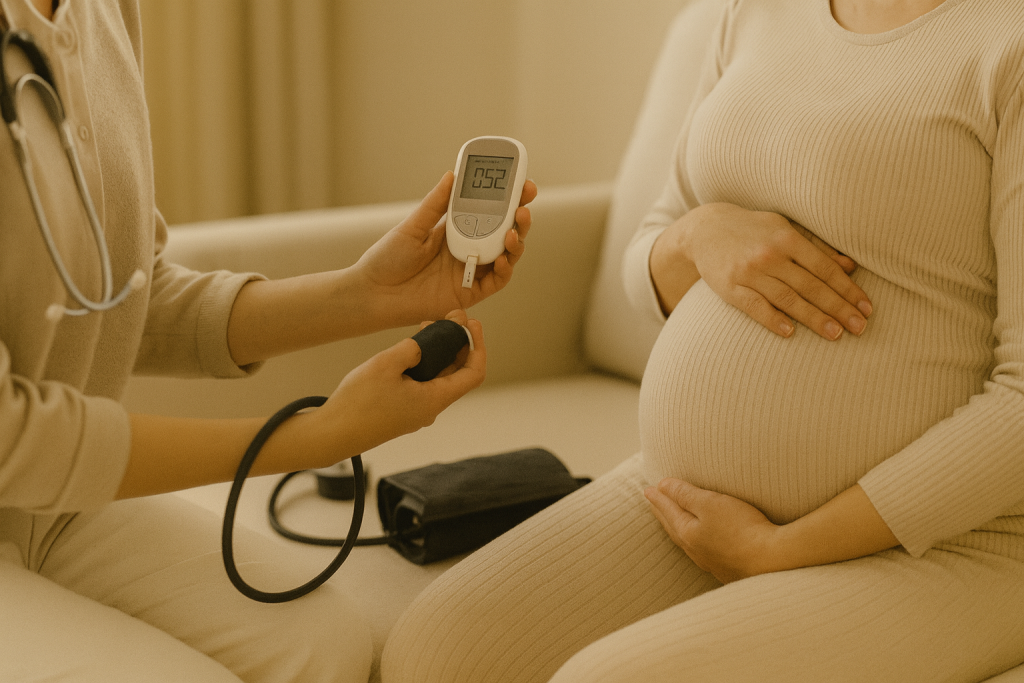
PREGNANCY
31 Jul 2025
Common Pregnancy-Related Medical Conditions: Gestational Diabetes, Hypertension, and Their Impact on Mother and Baby

Gestational Diabetes: Understanding the Risks
Gestational diabetes is a type of diabetes that develops during pregnancy and typically resolves after childbirth. However, it can have significant consequences if not properly managed. This condition occurs when the body cannot produce enough insulin to handle the increased blood sugar levels that naturally occur during pregnancy. According to the *World Health Organization* (WHO), gestational diabetes affects around 5-10% of pregnancies worldwide. Women with gestational diabetes may be at increased risk of developing type 2 diabetes later in life.
Studies, including one published by the *Mayo Clinic*, have shown that gestational diabetes can lead to complications such as high birth weight (macrosomia), which can increase the likelihood of needing a cesarean delivery. Babies born to mothers with uncontrolled gestational diabetes are also at higher risk for neonatal hypoglycemia (low blood sugar) shortly after birth. Additionally, untreated gestational diabetes can contribute to preterm birth, respiratory distress, and, in some cases, stillbirth.
Pregnancy-Induced Hypertension (PIH) and Pre-eclampsia
Another common medical condition during pregnancy is pregnancy-induced hypertension (PIH), which refers to high blood pressure that develops after the 20th week of pregnancy. If left untreated, PIH can progress to a more severe condition called pre-eclampsia, characterized not only by high blood pressure but also by damage to organs like the kidneys and liver. According to a study published by the *Mayo Clinic*, pre-eclampsia affects about 5-8% of all pregnancies and is a leading cause of maternal and fetal morbidity and mortality.
Women with pre-eclampsia may experience swelling in the hands and feet, severe headaches, visual disturbances, and sudden weight gain. If left untreated, pre-eclampsia can lead to serious complications, including premature birth, placental abruption (when the placenta detaches from the uterus), and organ failure in the mother. The only definitive treatment for pre-eclampsia is delivery, which may be necessary even if the pregnancy is not full term. The *World Health Organization* advises that regular prenatal visits are essential for early detection of pre-eclampsia and to monitor blood pressure and protein levels in urine.
The Impact on Mother and Baby: Long-Term Consequences
The effects of gestational diabetes and hypertension during pregnancy can extend far beyond delivery. Women who experience gestational diabetes have a higher risk of developing type 2 diabetes later in life. Similarly, women with a history of pre-eclampsia are more likely to develop cardiovascular disease and hypertension in the future. The *American College of Obstetricians and Gynecologists* (ACOG) highlights that these conditions are not just short-term issues but long-term health concerns that require ongoing monitoring and management.
For the baby, gestational diabetes and hypertension during pregnancy can lead to a variety of complications, including developmental delays, difficulty with feeding, and even long-term health issues such as obesity and insulin resistance. Babies born to mothers with poorly managed gestational diabetes or pre-eclampsia may face additional challenges in their early life, including being born prematurely or with low birth weight, both of which can affect their development and future health.
How to Minimize Risks
Early detection and proper prenatal care are crucial for minimizing the risks associated with gestational diabetes and hypertension. Regular prenatal visits allow healthcare providers to monitor the health of both the mother and the baby, offering timely interventions when needed. Studies consistently show that maintaining a healthy lifestyle during pregnancy—such as eating a balanced diet, staying physically active, and managing stress—can help reduce the risks of developing these complications.
In cases of gestational diabetes, following a nutritious meal plan, engaging in regular physical activity, and monitoring blood sugar levels can help keep the condition under control. For women with PIH or pre-eclampsia, blood pressure management, along with timely medical interventions, can prevent the condition from worsening and reduce the risks to both mother and baby.
MOMent of me
This place grew from that moment- for every mom looking for a softer landing.
SITE BY MOMENT OF ME 2025